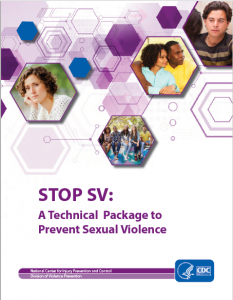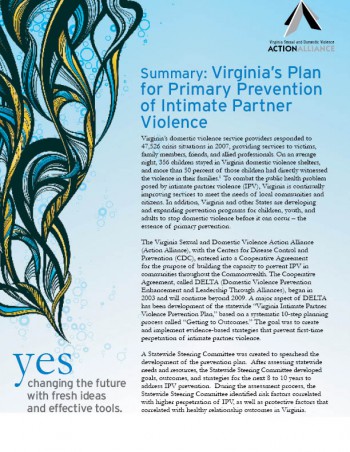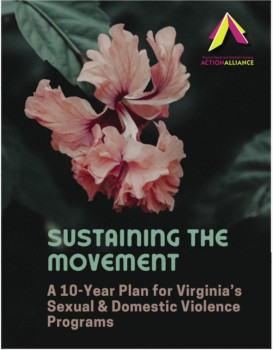Resources Library: Advocates
Start a Search:
STOP SV: A Technical Package to Prevent Sexual Violence

This Centers for Disease Control and Prevention technical package represents a select group of strategies based on the best available evidencde to help communities and states sharpen their focus on prevention activities with the greatest potential to reduce sexual violenced and its consequences. Each strategy includes a rationale, specific approaches, potential outcomes, and evidence.
Summary: Virginia’s Plan for Primary Prevention of Intimate Partner Violence

The Virginia Sexual and Domestic Violence Action Alliance (Action Alliance), with the Centers for Disease Control and Prevention (CDC), entered into a Cooperative Agreement for the purpose of building capacity to prevent IPV in communities throughout the Commonwealth. The Cooperative Agreement, called DELTA (Domestic Violence Prevention Enhancement and Leadership Through Alliances), began in 2003 and continues today.
A major aspect of DELTA has been development of the statewide “Virginia Intimate Partner Violence Prevention Plan,” based on a systematic 10-step planning process called “Getting to Outcomes.” The goal was to create and implement evidence-based strategies that prevent first-time perpetration of intimate partner violence. This document summarizes the 5 goals developed during the planning process.
Published by Virginia Sexual & Domestic Violence Action Alliance. 2009.
4 pages.
Supporting Multilingual and Bicultural Rural Advocates
Rural dual/multi-service advocacy programs that are able to provide culturally and linguistically appropriate services to sexual violence survivors make services for all rural survivors more inclusive and accessible. Multilingual and bicultural advocates are an important part of rural agencies being able to provide these culturally and linguistically appropriate services. A multilingual advocate is someone who can understand and speak more than one language. Often, multilingual advocates are bicultural as well. A bicultural advocate is someone who balances the cultural attitudes and customs of two countries or ethnic groups, usually someone who has moved to the United States from another country or someone whose parents moved to the United States from another country. Advocacy programs often struggle to find, hire, and retain multilingual and bicultural rural advocates. This is why it is important to understand who these advocates are, where they come from, and how we can create a supportive work environment for them. This paper is intended for rural dual/multi-service agencies looking for suggestions on how they can support multilingual and bicultural rural advocates.
Supporting Survivors of Abuse with Disabilities
Here are five modules designed for domestic violence and sexual assault service providers to learn how they can enhance their services for people with disabilities. CEU's are available.
These modules were created by the I-CAN! Accessibility Project. The I-CAN! Accessibility Project is a collaboration between the Virginia Commonwealth University School of Social Work and the Partnership for People with Disabilities.
Visit https://sites.google.com/vcu.edu/abusesurvivorswithdisabilities/home to access these resources.
Sustaining the Movement: A 10-Year Plan for Virginia’s Sexual and Domestic Violence Programs

In August 2021, during the second summer of the COVID-19 pandemic, a diverse group of Sexual and Domestic Violence Agency (SDVA) Directors convened to begin discussing the significant and ongoing funding and sustainability challenges faced by Virginia’s 70+ crisis response agencies. The Sustainability Planning Alliance (SPA) was formed, consisting of six Executive Directors and Action Alliance leadership. They met 1-2times a month for the next 18 months. The group represented diverse regions and perspectives across Virginia – including Hampton, Arlington, Fairfax, White Stone, Charlottesville, Harrisonburg, Richmond, and Radford – with public and non-profit organizations represented, dual sexual and domestic violence and single-issue agencies, Black, Brown and White agency leaders, urban, rural, and suburban service areas, and collectively, more than 100 years of direct experience in Virginia’s movement to end sexual and domestic violence. Based on these ongoing discussions and rigorous data gathering, the SPA offers the following 10-Year Movement Sustainability Plan and recommendations to the field.
RECOMENDATIONS FOR THE FIELD
- For Sexual and Domestic Violence Agencies (SDVAs) and Advocates
- - Build a strong diversified financial foundation for the work.
-
- Create robust administrative and operational capacity that supports growth, sustains current programs and staff, and is nimble in the face of programmatic and administrative challenges.
- For Funders and State Partners
- - Build active, reciprocal, and power-sharing partnerships with SDVAs.
-
- Engage with SDVAs to build a strong infrastructure for the field that can access and manage diverse resources and support well-resourced staff.
- For Legislatorsand Policy Leaders
- - Increase state and federal investments in community safety and sexual and domestic violence prevention.
-
- Advocate for the sustainability and growth of Virginia’s local SDVAs.
- For the Virginia State Coalition (Action Alliance)
- - Provide ongoing and robust training, technical assistance, and support to SDVAs to advance local sustainability strategies.
- - Create a unified mission, vision and values for the work of the SV/DV field while supporting agency autonomy, highlighting SDVAs and their value and impact, and providing forums and venues for people in the field to gather and share with people in similar roles and across identities.
This plan is not a mandate, rather it is a set of strategies, grounded in shared values and collective expertise gathered from advocates and directors across Virginia’s movement to end sexual and domestic violence. It is intended to act as a blueprint towards movement sustainability. Our vision is that these recommendations will become a reality and that at the local, state, and federal level, we will move in alignment towards a future in which every sexual and domestic violence agency throughout the Commonwealth is thriving and able to effectively meet the full needs of survivors, families, and their communities.
Download the plan using the link below.

